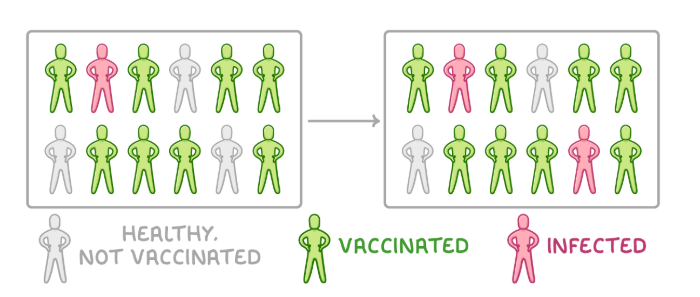immunity and vaccination
1/14
There's no tags or description
Looks like no tags are added yet.
Name | Mastery | Learn | Test | Matching | Spaced | Call with Kai |
|---|
No analytics yet
Send a link to your students to track their progress
15 Terms
types of immunity (2)
→definition
→2 types explained
→examples
active immunity
-when your immune system produces its own antibodies after being exposed to an antigen
→natural: you become immune after infection→your body produces its own antibodies (e.g. chickenpox)
→artificial: you become immune after having a vaccination (e.g. MMR vaccine)
passive immunity
-when you are given antibodies made by another organism [your body doesnt make them]
→natural: e.g. antibodies passed from mother to fetus through placenta
e.g.antibodies passed from mother to baby in breast milk
→artificial:you become immune after having an injection of antibodies (e.g.injected after tetanus)
which immunity lasts longer?
which immunity is short-term?
active immunity because your body produces memory cells
passive immunity because antibodies are broken down and memory cells are not produced
compare the 2 immunity
→how its gained
→memory cells?
→response
→duration of immunity
-similarites
active immunity
-your immune system produces its own antibodies after being exposed to an antigen
-memory cells are produced
-it takes time to develop
-immunity lasts longer
passive immunity
-antibodies are given from another organism
-memory cells are not produced
-provides immediate protection against pathogens
-immunity is short-term
SIMILARITIES
-Both can be natural or artificial
-Both provide protection against disease.
autoimmune diseases
→definition
→why does it occur
→example→ caused by? symptoms (2)?
→short-term or long-term→ why?
→treatment
the immune system attacks the body’s own cells→ because it’s unable to recognise self-antigens (antigens on the body’s own cells)
e.g. arthritis→ caused by the immune system attacking cells in the joints→causes pain and inflammation [MUST KNOW]
are long-term bcs there are no cures
patients can take medication (e.g. immunosuppressant drugs) to relieve their symptoms
what does vaccine contain? (2)
- dead pathogens
antigens from pathogens
what happens when vaccine enters body? (4)
-it stimulates the primary immune response to produce antibodies against the pathogen.
-memory cells are produced
-if the same pathogens enters again, the secondary immune response produces antibodies quickly
-the pathogen is destroyed before it causes symptoms [this gives immunity]
![<p>-it stimulates the primary immune response to produce antibodies against the pathogen. </p><p>-memory cells are produced </p><p>-if the same pathogens enters again, the secondary immune response produces antibodies quickly</p><p>-the pathogen is destroyed before it causes symptoms [this gives immunity]</p>](https://knowt-user-attachments.s3.amazonaws.com/080e7b3f-2db6-42a4-b6fb-a4e33231c890.png)
role of vaccination
reduces the spread of diseases
herd immunity
occurs when a large proportion of a population are vaccinated against a disease which reduces the spread of the disease to unvaccinated individuals.

how does herd immunity help prevent epidemics (mass outbreak of disease on a national level)? (4)
-herd immunity occurs
-many people are vaccinated so most people cannot catch or spread disease
-this reduces the chance of unvaccinated individuals catching diseases
-As a result, fewer people catch the disease.
why is it impossible to vaccinate everyone?
-Some people have weakened immune systems→e.g. babies, elderly people, and patients with compromised immune systems
-very young children are too young to be vaccinated.
role of booster vaccines
Booster vaccines are given later to produce more memory cells for long-lasting immunity
routine vaccinations
→examples (2)
vaccines offered to everyone
-MMR for children (protects against measle)
-Meningitis C
why do vaccines and vaccination programmes change? (3) example
some pathogens can mutate so antigens change
immune system does not recognise the new antigens on pathogen
therefore vaccines are changed frequently
e.g. influenza vaccine (against influenza virus) changes every year
why is it difficult to develop vaccinations for common cold? (3)
The common cold is caused by many different viruses
These viruses mutate frequently, changing their antigens.
This makes it hard to create an effective vaccine
name of process when pathogens change their antigens
antigenic variability